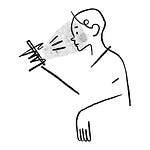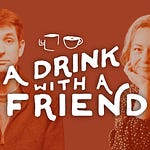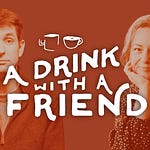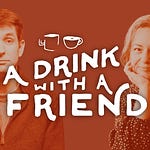Acedia isn’t a byproduct of our modern society, it’s a byproduct of being a human being on earth. Thankfully, there are a few small things that do a world of good to fighting this “noonday devil.”
Tsh’s free weekly email, 5 Quick Things
Fr. Harrison Ayre on Twitter
The Noonday Devil, by Abbot Nault
Acedia & Me: A Marriage, Monks, and a Writer's Life, by Kathleen Norris
Get 25% off when you go to LiquidIV.com and use code GOODLIST at checkout.
This is The Good List — I’m Tsh Oxenreider.
This is a habit.
The writer Kathleen Norris once said this: “Most anyone who has endeavored to maintain the habit of prayer, or making art, or regular exercise...knows the syndrome well. When I sit down to pray or write, a host of thoughts arise. I should call to find out how so-and-so is doing. I should dust and organize my desk, because I will get more work done in a neater space. While I'm at it, I might as well load and start the washing machine. I may truly desire to write, but as I am pulled to one task after another I lose the ability to concentrate on the work at hand. Any activity, even scrubbing the toilet, seems more compelling than sitting down to face the blank page.”
This is from her book, Acedia & Me: A Marriage, Monks, and a Writer's Life, and I don’t know about you, but I completely resonate with her words here. You start the day with the best of intentions: I’ll work out at 2 pm after I’ve started a load of laundry, I’ll reply to these 6 emails that are waiting to hear back from me, I’ll call the dentist and make that appointment. You’re thinking through your day as the coffee percolates, and you think to yourself, “It’s gonna be a good, productive day, full of checking off adulting tasks left and right.” You might even start your morning off getting some of those things done — dishwasher: emptied, plants: watered, boss’ Slack message: replied to. But then… something happens.
It’s a weird thing, really, because it’s unexpected, yet it happens all the time. It’s nothing you want, yet you find yourself caving into it with little fight. It’s called ‘acedia,’ and it happens to the best of us. And if I could only explain to you how thick and creamy the irony is that I’m talking to you right now about acedia, reading from notes that took me SO. GOSH-DARN. LONG. to write up because of acedia, I’d be swimming in a vat of warehouse-size peanut butter.
If you’re a human being, fighting acedia is very often part of your daily or weekly life. And if you’re a human being dealing with the weirdness of all *this* — whatever we’re calling this coronatide we’re all walking through right now (because I’m currently going WAY out of my way to avoid the exhausted cliche ‘these unprecedented times’) — you’re probably dealing with it even more than usual. I know I am. Acedia often wakes me up, then tucks me into bed at night.
But what is acedia? It’s a good question. I’d honestly completely forgotten about it even being a thing until a priest I follow on Twitter, named Fr. Harrison, tweeted about it one day, and has been tweeting little anti-acedia reminders almost every day, much to my benefit.
Acedia, put simply, is spiritual or mental sloth. It’s from the Latin word for negligence and the ancient Greek word for indifference, and its word origin describes it pretty well. According to its wikipedia page, it’s “a state of listlessness or torpor, of not caring or not being concerned with one's position or condition in the world.” Early monks used it to describe a spiritual state of listnessness, and in modern times, it’s often an ingredient that when not noticed, can slide us into depression.
Smart people have personified it throughout history by calling it the “noonday devil,” but I often associate it with the shortcode of “having the blahs.” Now, it’s sometimes connected to the vice of sloth, but it doesn’t really mean that, because acedia can also look like busyness, because it all comes down to forgetting your purposeness. In his book, The Noonday Devil, Abbot Nault says “acedia is a gloomy combination of weariness, sadness, and a lack of purposefulness. It robs a person of his capacity for joy and leaves him feeling empty, or void of meaning.”
If you’ve experienced acedia before, you’re probably nodding your head through all this. I know I did when I first started reading Fr. Harrison’s tweets about it. He goes much deeper into the spiritual apathy our souls tend to veer towards, so I encourage you to read more from him if you’d like to unpack more of that (he’s also recently published a really good article on acedia). But for the sake of this episode on a podcast called The Good List, I want to focus on what we can do about acedia — because it’s a good thing to fight it regularly, and with joy. Really and truly. (And I’m telling this to myself as much as to you right now, believe me.)
Here are the two things I’m finding right now most helpful to my fighting of acedia, especially during this pandemic, when everything is slower and simpler:
I’m making a do-able to-do list and keeping it front and center during my weekdays. Trust me, this simple idea is hard for me right now, because all I want to do is read, go on walks, and dig in my garden. But I’m an adult with responsibilities, so I have to get things done whether or not I feel like it. This means writing down the things I need to do so I don’t forget them. I’ve been forgetful lately, so this is important. And it’s also been hugely helpful these days to have a regular rhythm to my days, even if that rhythm is super simple. I’m gonna talk about that more in the next episode of The Good List, but in the meantime, if you’ve stopped making a simple to-do list for your days, consider taking that habit back up. It helps me to make one master to-do list for the week, then refer to that to extract a few things for each day, because if I just jot down everything that comes to mind on the day I think of it, I get overwhelmed. I create a master to-do list in my journal, then every morning, pull a few things from it. When I remember something new, unless it urgently needs to happen that day, I jot it down on the master weekly list, not the daily one. I also mark the top 3 items of each day, knowing there’s a good chance I’m not gonna get all of my day’s list done. These top 3 things are my most important items — if I get these 3 things done, then I’ve fought acedia fairly well for the day. Because you want to make sure and not veer into the land of needless busyness, either — that’s acedia, too. You want to remember the purpose of your day, and that’s not to get a lot done. You’re not a productivity machine. You’re a human being with a soul, and you have responsibilities, yes, but you’re also meant to live your life well. That doesn’t mean overextending yourself.
The second thing I do is make sure I spend a good chunk of my time doing something physical and offline, preferably outside. We cannot be hyper-connected all the time and expect to be healthy and have a good attitude. Just like we don’t want our kids to have too much screen time, it’s not good for us either. And our bodies are meant to move — they don’t like to be still all day. The outdoors is the best antidote to digital screens that I know of. These days in the spring, it looks like gardening for me — manual labor, digging and weeding and watering. It’s so good to be part of the rhythms of nature. But it can also look like going on a long walk or run, taking my workout outside, or playing a game with my kids or dog. You’ve been there: you’re sitting and connected to a screen, and before you know it, you feel like a dazed zombie, unable to move even though you want to. That’s acedia.
The thing that encourages me these days is that the idea of acedia isn’t new — people have been writing about it for literally thousands of years, so it’s not a byproduct of our modern society. It’s a byproduct of being a human being on earth. We’re hardwired to lean towards it when we don’t actively pay attention to it, yet it’s fairly simple to resolve. It’s not easy, but it’s simple. It’s being an adult and doing things even when we don’t want to, yet not with the attitude that it makes me a better person or is the definition of my value, and it’s making sure I move my body and connect with the earth around me. These small things do a world of good to fighting acedia.
And if you’re like me these days, and you feel the acedia coming on strong, I get it, I really do. You’re not a bad, irresponsible person for dealing with it — you’re simply a human being. But we’ve got to fight it so the noonday devil doesn’t get the best of us. Let’s remember our joy and our purpose, so that we can keep waking up another day, to rinse and repeat our lives. We can do this.
[VOICEMAIL]
Hi, this is Rachel calling from Tacoma, Washington. The two things that are helping me get through this quarantine, number one, petting any dog that I can. I'm single and I live alone, so this lack of human contact is really challenging. But when I come across some kind of living creature that I can seek to interact with, I go for it. The other thing, I'm a little surprised, is mascara because I'm finding that the difference between, some days, the difference between being a person trapped at home during a pandemic and a person who is working from home is juju-ing using up my face just a little bit, somehow it does wonders for me. Also, I made the French butter cake from The Frugal Farm Wife and let me tell you it's very very good. Have a good day. Bye.
[VOICEMAIL ENDS]
A little reminder that if you haven’t yet, to sign up for my free weekly email called 5 Quick Things, where I share 5 things I either created or loved from the week. Go to fivequickthings.email to sign up, and you’ll get the next weekly email that goes out on Friday mornings.
I’m on twitter @tsh and sometimes on IG @tshoxenreider, and you can also find a transcript and the show notes of this episode, and all episodes, at thegoodlistshow.com.
And don’t forget to leave me a voicemail or send me a voice recording, telling me one thing that’s currently on your Good List. Leave me a voicemail at (401) 684-GOOD or record your voice and email the voice file to hi@tshoxenreider.com. State your name and where you’re from, and what’s one thing that makes your life better right now, and we may feature it here on the show.
Thanks to Rachel for sharing with us what’s on her Good List. Music for the show is by Kevin MacLeod, and thanks, as always, to Caroline TeSelle and Kyle Oxenreider for their help, as well as my furry intern, Ginny. I’m Tsh Oxenreider, and I’ll be back with you soon — thanks for listening to The Good List.










Fight Acedia